Until we forsake all, we’ll always have a backdoor of escape to obedience. 
The bridge of excuse will remain intact and the escape hatch will remain to disobey God’s voice. We’ll remove ourselves from the heat that comes from His consuming fire intended to burn “self” when we forsake all.
Jesus said, “So likewise, whosoever he be of you that forsakes not all that he has, he CANNOT be my disciple.” (Luke 14:33) Our extra affords our disobedience and builds our bridge of excuse to disobey.
There was a rich young ruler who desired eternal life. He was a divinely coordinated “prop” for Jesus to illustrate a point and teach all of us who desire eternal life. There were little children who were brought to Jesus that he might lay his hands on them and bless them but his disciples rebuked them. (Matthew 19:13)
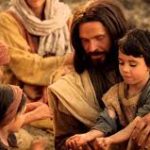 Jesus then responded, “Suffer the little children and forbid them not to come unto me, for of such is the kingdom of heaven” and he laid his hands on them and then they departed the scene.
Jesus then responded, “Suffer the little children and forbid them not to come unto me, for of such is the kingdom of heaven” and he laid his hands on them and then they departed the scene.
Enter the lesson of the rich young ruler. And behold, one came and said unto him, “Good master, what good thing 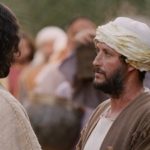 shall I do that I may have eternal life?”
shall I do that I may have eternal life?”
Jesus responded by saying if you want to enter into life, keep the commandments. The young man asked, “Which?”, revealing he was looking for a reason to disobey rather than obey. So Jesus obliges him to reveal which one he wouldn’t obey.
He goes through a list of commands until he gets to “and thou shall love your neighbor as yourself”. The “unruly” young ruler “prop” self-righteously answers, “All these things have I kept from my youth” but in his heart knowing something was still missing asks, “What lack I yet?”
So Jesus gives it to him straight and reveals his self-serving “Bridge to Nowhere”. “If thou wilt be perfect, go and sell that thou hast and give to the poor, and thou shall have treasure in heaven and come and follow me.”
This was truly the proposition of an eternal lifetime. Only the young man possessed the match to burn his bridge.
He couldn’t imagine life without his stuff. He couldn’t imagine depending on what he didn’t have and a life of dependence upon a provider rather than his provision. Instead of burning his bridge, he walked over it crossing his bridge to nowhere.
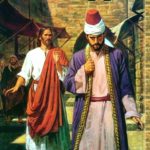 Matthew 19:22 states, “But when the young man heard that saying, he went away sorrowful: for he had great possessions.” As he walked away, Jesus turned to his disciples and said, “Verily I say unto you, that a rich man shall hardly enter into the kingdom of heaven.”
Matthew 19:22 states, “But when the young man heard that saying, he went away sorrowful: for he had great possessions.” As he walked away, Jesus turned to his disciples and said, “Verily I say unto you, that a rich man shall hardly enter into the kingdom of heaven.”
We might say to ourselves, “Well, I’m not rich like that young man”, but the truth is we all rationalize in our own mind that a rich person is someone richer than ourselves.
The real truth is our extra affords our disobedience. It purchases the materials and labor to build our own bridge of escape from obedience to the difficult things Jesus asks of each of us.
There is a reason why Jesus said unless we forsake ALL that we have, we CANNOT be his disciple.
If each of stood before the Lord, what would it be He would point out to us that would be difficult to forsake. What if it was our own life he’s asking us to give up?
Jesus said, “If any man will come after me, let him deny himself, and take up his cross, and follow me. For whosoever will save his life shall lose it: and whosoever will lose his life for my sake shall find it. For what is a man profited, if he shall gain the whole world, and lose his own soul? or what shall a man give in exchange for his soul?” (Matthew 16-24-26)
The key to eternal life is death. It’s the entrance ramp to the narrow road of obedience that leads to life but sadly few there be that find it. The power of possessions loses its grip when self is denied and our life is laid on the altar.
 What value do possessions have when a man who owned them dies? What control do they possess over a dead man? They only have the power to control a live man and this is the point Jesus made with the rich young ruler.
What value do possessions have when a man who owned them dies? What control do they possess over a dead man? They only have the power to control a live man and this is the point Jesus made with the rich young ruler.
Little children come with trust in a person not with what they own. This is the illustration Jesus made with these two props, the little children and the rich young ruler. One will enter the kingdom they trust in a provider, the other will not enter because they trust in what they already have.
Salvation can’t be purchased, neither by what we have nor what we do. When the rich young ruler asked what he must do to inherit eternal life and when Jesus told him, he walked away. Jesus then said, “It is easier for a camel to go through an eye of a needle than a rich man to enter into the kingdom of God.”
His disciples were exceedingly amazed at these words and said, “Who then can be saved?” Jesus then gives them the answer, “With man this is impossible but with God all things are possible.”
Our salvation is only possible to those who trust, not in themselves in what they have nor what they do, but in God. Only those trusting as a desperate little child for their eternal care will enter the kingdom.
A man could attain the entire world and still not exchange it for his own soul.
There is nothing that affords our disobedience like our extra and nothing affords our obedience like our dependence. They are directly opposed to each other and will always do battle either for or against our eternal soul.
The road to death is living for self, the road to life is denying self.
When Jesus told the rich young ruler, “Thou shall love thy neighbor as thyself”, He needed go no further in his conversation because that is where He hit the proverbial nail on the head. He loved his stuff more than he loved God and Jesus proved it when he walked away. The rich young ruler wouldn’t give up his former love to gain a new one.
The truth is he loved himself more than he loved God therefore his life meant more to him than his neighbor’s life.
If someone told you eternal life was free, he wasn’t speaking for Jesus. Eternal life according to Jesus will cost us everything including our own lives. He said, “Whosoever will lose his life for my sake shall find it. Unless a corn of wheat goes into the ground and dies, it abides alone.” (Matthew 16:25, John 12:24)
Our lives will only bear eternal fruit after we willingly lay our own life down. That is when the power of sin and the power of stuff will lose its grip.
We must let go of the world and the things of this world for the world to let go of us; but once we let go, the freedom we experience will last for eternity.
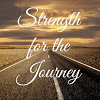
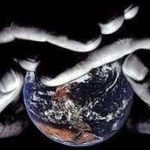
Leave a Comment